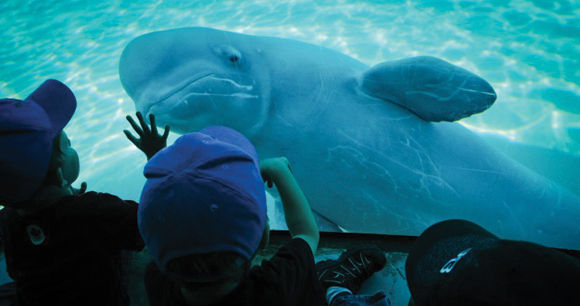In October 2019, the National Marine Fisheries Service (NMFS) indicated it had received a permit application from Mystic Aquarium to import five captive-born beluga whales from MarineLand in Canada, for the purposes of scientific research. Two elements of this application are potentially precedent setting. First, these belugas are captive-bred offspring of whales caught from the wild in Russia, from the Sakhalin Bay-Amur River population that was designated as depleted under the Marine Mammal Protection Act in 2016 (see AWI Quarterly, summer 2016). Second, while it is legal to import members of a population designated as depleted for research, it is illegal to import them for public display. Mystic has no dedicated research facilities—all of its belugas are on display, even when used for research.

Other depleted marine mammals have been held for research with “incidental” public display in the United States, but they were already in the country (rescued from the wild or born in US facilities). The international trade element of this situation is relevant: If the United States became a market for Russian belugas or their offspring, the incentive to continue captures in the wild would increase.
Mystic stated clearly that it would allow these whales to breed, and if any pregnancies, births, or calves result from this laissez-faire attitude, it would conduct reproductive research. However, Mystic was quite murky about what would become of the whales after the research. It hinted in its application that any calves, as well as the five imported whales, might eventually be placed on permanent public display at Mystic or other facilities such as Georgia Aquarium.
This would be illegal. AWI and other organizations pointed this out and made other arguments against the import in comments submitted to the government, urging NMFS to deny the request. Pragmatically, however, we also emphasized that if a permit was issued, it must contain three conditions: First, no breeding—the reproductive study proposed must be disallowed and contraception must be practiced. Second, no performance—“incidental” display is far from ideal, but certainly there should be no public interactions or shows. Finally, all decisions regarding what happens to these whales during and after the five-year period of the permit should be made by NMFS, not the permit holder.
AWI and allies were prepared to go to court had the permit been issued without these conditions. There are other reasons why this permit is problematic, but these prohibitions would at least prevent the government from setting an entirely negative precedent. Therefore, when NMFS did issue the permit at the end of August, we were gratified to see that it included all three conditions. We are following up with the agency regarding the other elements of concern, but feel that the strong permit conditions make the belugas’ import more a simple change of residence than an international trade precedent with broadly negative consequences. We will remain vigilant to future efforts to move Russian belugas and their offspring across international borders as we seek to ensure that the United States never becomes a market for their commercial trade.